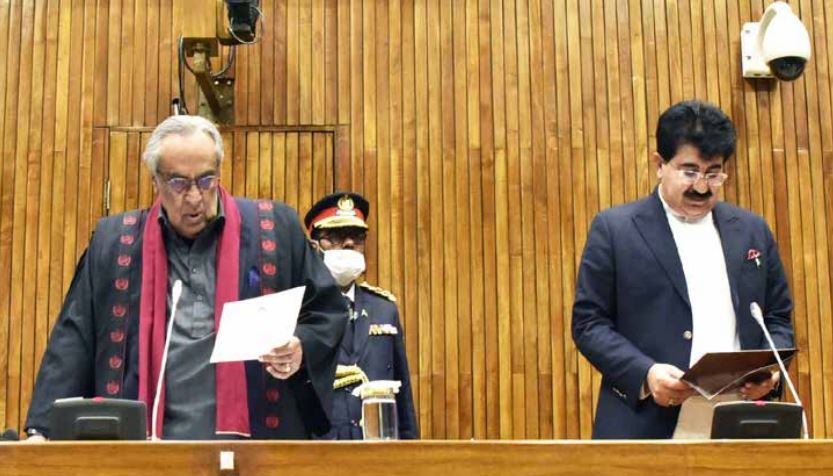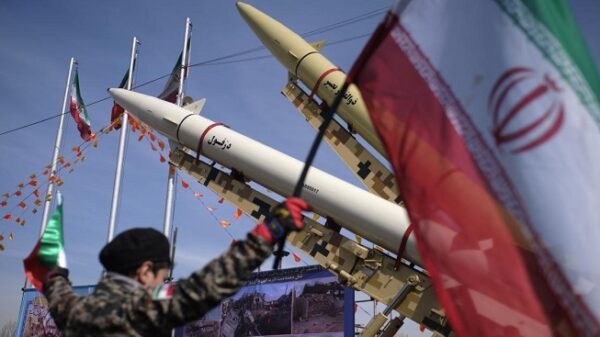After a high-stakes and thrill-filled Senate election mired by controversies, the country finally has a new and, as expected, a completely hung Upper House of the Parliament. The government-backed Sadiq Sanjrani has managed to retain the Senate chairman office for another term — thanks to the eight rejected votes.
The Senate elections, which had never got much public attention in the past, this time remained the topic of general discussion and debates on the national and social media for almost three months because of a number of controversies that hit the process, starting with the filing of a presidential reference to the Supreme Court of Pakistan by a desperate government in December last year seeking an open ballot to the detection of spy cameras inside the Senate hall hours before polling for the offices of the chairman and the deputy chairman.
The dramatic events that took place during this period literally turned the whole country into a theatre as the people watched all the happenings like a thrill-filled comedy and action movie in which they saw the characters engaged in wheeling and dealing, exchanging currency notes under the table like members of the underworld mafia, abusing and fighting with each other on the floor of the parliament as well as on the famous D-Chowk on the Constitution Avenue. Senate voting results were very suspiciously interesting as Yusuf Raza Gilani took more than his actual identified strength as was from his clear party position. More interestingly, the PDM even called it a democratic victory. They also claimed that they got the votes of the opposing side. That claim was also raised before the Election Commission by the government alliance.
On the other hand the election of Chairmanship was almost quite near to the party position identified as earlier, only the rejected votes worked in favor of the winning candidate. However in the Deputy Chairman’s election, Afridi took more votes than parties’ stated strength.
As per independent calculations, PDM and Government Alliance had 49 votes each in the senate. The winning candidate got 48 votes and Yusuf Raza Gilani defeated by getting 42 votes. Now PDM maintained it as a rigged election.
What was done in National Assembly senators’ election for federal seat, it was almost repeated in the Senate Chairman and Deputy Chairman’s election.
The Sanjrani’s victory in the opposition-dominated house has not come as a surprise for many as previously he had survived a crucial vote of no trust despite the fact that at that time the difference between the number of treasury and opposition members was nearly seven times higher than now.
It was after a close and nail biting contest that Mr Sanjrani, who belongs to the Balochistan Awami Party (BAP), was declared winner by Presiding Officer Syed Muzaffar Hussain Shah through a ruling rejecting seven controversial votes that had been polled in favour of Mr Gilani. The chair rejected another ballot which had apparently been wasted intentionally as the voter had stamped both the candidates. Now PDM has decided to challenged this ruling in court of law.
Mr Sanjrani, secured 48 votes against Mr Gilani’s 42 votes.
Later, Mirza Muhammad Afridi from the erstwhile former Federal- ly Administered Tribal Areas (Fata) became the new deputy chairman as he defeated Maulana Abdul Ghafoor Haideri of the opposition with a 54-44 vote.
Surprisingly, the rejected votes had acquired all the more significance than the valid polled votes since the defeat of the opposition’s no trust motion against Mr Sanjrani in August last year. In the crucial one-on-one contest in the National Assembly on March 3 on a general seat from Islamabad, Mr Gilani as the opposition’s Pakistan Democratic Movement (PDM) candidate had defeated Finance Minister Dr Abdul Hafeez Shaikh with 169-164 votes whereas seven votes were rejected meaning thereby that the number of rejected votes exceeded the margin of victory.
These rejected votes are sighted with suspicion amid allegations of the use of money and involvement of the establishment and agencies in the election process. Before the March 3 Senate elections, Yousuf Raza Gilani had stated that he believed that the establishment was neutral in the Senate election process. The other opposition parties in the PDM, including the Pakistan Muslim League-Nawaz (PML-N) and the Jamiat Ulema-i-Islam (JUI-F), distanced themselves from Mr Gilani’s assertion, but preferred not to speak on the matter as before the March 3 elections as a strategy. But soon after an upset victory by Mr Gilani and the prime minis- ter’s vote of trust, the opposition parties, including the PPP, once again started raising fingers at the establishment. Now Gillani repeated that establishment has no role in chaiman senate elections.
The first special session of the new Senate began with a noisy protest by the opposition led by PPP’s Raza Rabbani who claimed that “secret cameras” had been installed at the polling booth. Amid
slogans of “shame, shame”, the PPP senator termed it a violation of Article 226 of the Constitution which called for maintaining secrecy of the ballot.
On the opposition’s demand, the presiding officer not only ordered the changing of the polling booth, but also referred the matter to a
committee for investigations. The cameras above the polling booth had been detected by PPP Senator Mustafa Nawaz Khokhar and PML-N’s Musaddiq Malik during the inspection of the polling booth.
After Sanjhrani’s victory, the treasury members are now advising the opposition to accept the defeat with a big heart and patience, forgetting that after the defeat of Dr Hafeez Shaikh, they had not launched a tirade against the ECP, but also made every effort to prevent the Commission from issuing Mr Gilani’s victory notification. The PTI has also filed a petition before the ECP challenging Mr Gilani’s election on the basis of a leaked video showing Mr Gilani’s son Ali Haider Gilani telling the PTI MNAs about the techniques to waste their votes before the March 3 elections is still with the ECP.
Though, the government has managed to retain both the offices of the chairman and the deputy chairman, the fact that despite being
the largest party, the Pakistan Tehreek-i-Insaf (PTI) will not be in the driving seat in the Senate has caused great frustration within the ranks of the ruling party despite the fact that all the results of the Senate election – except the one – had remained as per expecta- tions. The upset caused by Mr Gilani by defeating Federal Minister for Finance Dr Abdul Hafeez Shaikh in a one–on-one contest on a general seat from Islamabad for which polling was held in the National Assembly, however, shattered the ruling alliance and forced Prime Minister Imran Khan to seek a fresh vote of confidence. Now this confidence, to some extent has been restored.
On March 6, the Prime Minister obtained a trust vote from the same assembly where his nominee had faced defeat at the hands of the opposition only three days back. The premier won the vote of confidence with 178 ballots cast in his favour — six more than required. The opposition parties, however, stayed away from the session.
The opposition later rejected the vote of trust, alleging that Mr Khan had secured the vote by using “state institutions” and the “secret agencies”. The opposition also questioned the act of seeking trust vote from the members who had been accused of selling their votes in the Senate election. PML-N Vice President Maryam Nawaz while addressing a press conference after a party meeting attended by all senior PML-N leaders on March 7 alleged that two ruling party MNAs who had resisted the pressure were “locked up in a container for four hours” in a facility at Golra in Islamabad and forced to vote in the premier’s favour. She alleged that the government had kept a watch on each MNA using “drone cameras.”
SENATE COMPOSITION
After the Senate elections, the strength of the upper house has been reduced to 100 senators. Presently, it consists of 99 senators as Ishaq Dar, who has been living in London in self-exile, has not taken oath as a senator.
The ruling coalition includes 27 members of the PTI, BAP (12), MQM (3) and one each of PML-Q and PML-F. Besides them, the three independent senators are also sitting on the treasury benches.
The opposition senators include 21 of the PPP, 17 of the PML-N, five of JUI-F, two each of ANP, BNP-Mengal, PkMAP and National Party. The Jamaat-i-Islami (JI) with one senator is neither the part of the government nor the opposition’s alliance and its lone senator had abstained from the voting in the Senate chairman and deputy chairman elections.
TEST FOR OPPOSITION
At the time of nominating Mr Gilani and Mr Haideri as the joint opposition candidates for the Senate chairman and deputy chairman office, respectively, the PDM had announced that the office of the leader of the opposition would now go to the PML-N despite the fact that the PPP is the largest party on the opposition benches with 21 senators.
There was resentment within the PPP ranks over the PDM’s decision and now when both Mr Gilani and Mr Haideri had lost the elections, there are reports that the PPP is considering to re-open the matter. Many in the PPP believe that it is the party’s right to get the office of the opposition leader and they remained silent when the PDM made the decision only for the sake of unity and because they do not want to create difficulties for Mr Gilani in his election for the Senate chairmanship. Following the announcement that seven votes cast for Yousaf Raza Gillani were rejected because the stamps were not correctly placed on the ballot paper, PPP Senator Farooq H Naik tells the presiding officer: “You do not have the right to reject the vote if it has been stamped outside the box in front of the candidate’s name.”
“The rejected votes that you are talking about have been stamped within the boxes in front of the candidates’ names,” he said, adding that the rules are silent regarding where one can stamp on the ballot paper.
“Why should the voter suffer due to the mistake of the secretariat,” says Naik to the presiding officer.
In response to the argument, the presiding officer says that the stamp must be placed in front of the candidate’s name to be considered valid.
Adamant that Gillani is the “actual winner,” of the election, the Opposition has decided to take the matter to the election tribunal.
The polling for the Senate chairman’s post started at 3pm, presided over by officials from the Senate Secretariat. The process of voting completed at 4:40 pm, but counting started after the official time, i.e. 5pm. The polling time for the election of the deputy chairman of the Senate was completed at 6:59pm, while the results were announced at 7:08pm.
Jamaat-e-Islami Senator Mushtaq Ahmed abstained from casting his vote in the elections. The senator’s name was called twice by the presiding officer but he did not get up from his seat.
The senator had already announced that he will not take part in the elections after his party boycotted the polls.
Khalid Wasim is Islamabad based senior journalist. He writes on political issues.










